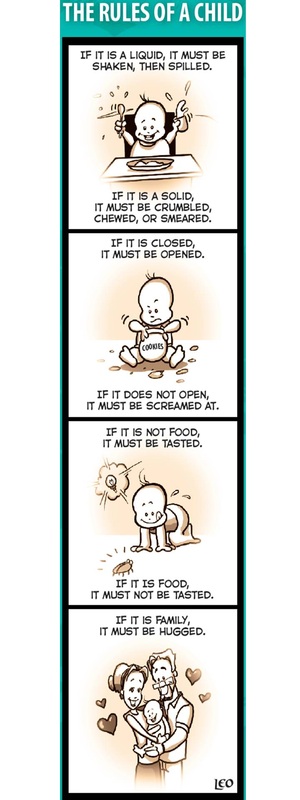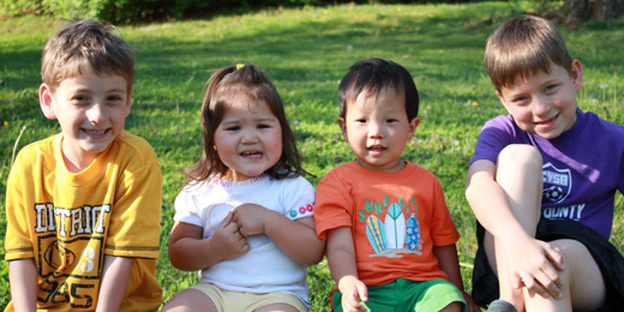|
Misty Kay
My nine- and ten-year-olds came whining to me again. "Mommy, Chalsey's taking all the LEGO blocks!" "Davin always gets the best pieces!" Kristy, my five-year-old was crying. "It's not fair. I want to build an airplane, but they don't want to." This had been going on all afternoon. It was one thing after another. No matter how many toys they had, they couldn't have fun. Something was missing. I shot up a quick prayer for an illustration that would help us to get a grip on the problem. "Who likes plain, dry pancakes?" I asked. The kids froze and looked surprised at my sudden change of subject. "Who likes plain pancakes with nothing on them—just dry, get-stuck-in-your-throat pancakes?" "Not me!" they all cried in unison. "I see. So when you asked me to make pancakes yesterday, you didn't want plain pancakes. You wanted pancakes and pudding." It had been a special Father's Day breakfast of hot pancakes smothered in creamy white chocolate pudding. It was a melt-in-your-mouth treat. "And when you say you want to play with toys, you don't mean you want to play with plain toys, any more than you wanted plain pancakes. It was the pudding that made it special. Your friendship is like the pudding. Without the friendship, the game is no fun. Even if you got every LEGO piece you wanted, your playtime would still be dry. No fun. What makes it special is when you all play the game together. That's when you really have a good time. You need 'pancakes and pudding.'" The children understood the illustration perfectly and decided to play a game together. It worked like magic. We were stuck in the house for the next few days due to bad weather, but no one seemed to mind. The children played with every game and toy in the house. Any time tempers flared, I'd tell the kids, "The pancakes need some more pudding." As I thought more about it later, I realized that lesson wasn't only for my children. I sometimes work so hard to accomplish the goals I set for myself, and view everything else as a distraction. "I need to do this! I have to get that done!" I want plain, uninterrupted work time, and then I wonder why my work feels so dry and unenjoyable. How often we all try to eat our pancakes dry. We put such an importance on things we need to do that we forget that pancakes aren't enjoyable without a topping. We can't let our work or play crowd out the friendships that make our lives complete. So if you find that your day is crowded with worries, stress, and work upon work, if you feel you've lost that spark, if you're feeling a little dry, perhaps all you need is a heaping scoop of sweet, fresh "pudding" to make your day complete.
0 Comments
 A group of social scientists asked this question to a group of four-to-eight-year-olds: "What does love mean?" The answers they got were broader and deeper than anyone could have imagined. See what you think. "Love is that first feeling you feel before all the bad stuff gets in the way." "When my grandmother got arthritis, she couldn't bend over and paint her toenails anymore. So my grandfather does it for her all the time, even when his hands got arthritis too. That's love." "When someone loves you, the way they say your name is different. You know that your name is safe in their mouth." "Love is when you go out to eat and give somebody most of your French fries without making them give you any of theirs." "Love is when someone hurts you, and you get so mad but you don't yell at them because you know it would hurt their feelings." "Love is what makes you smile when you're tired." "Love is when you kiss all the time. Then when you get tired of kissing, you still want to be together and you talk more. My mommy and daddy are like that." "Love is what's in the room with you at Christmas if you stop opening presents and listen." "If you want to learn to love better, you should start with a friend who you hate." "When you tell someone something bad about yourself and you're scared they won't love you anymore. But then you get surprised because not only do they still love you, they love you even more." "There are two kinds of love, our love and God's love. But God makes both kinds of them." "Love is like a little old woman and a little old man who are still friends even after they know each other so well." "My mommy loves me more than anybody. You don't see anyone else kissing me to sleep at night." "Love is when Mommy gives Daddy the best piece of chicken." "Love is when Mommy sees Daddy smelly and sweaty and still says he is handsome.” "Love is when your puppy is so glad to see you even though you left him alone all day." "Love cards say stuff on them that we'd like to say ourselves, but we wouldn't be caught dead saying." "You really shouldn't say I love you unless you mean it. But if you mean it, you should say it a lot. People forget." Excerpted from the writings of Maria Fontaine
Part of helping your children to grow and mature is teaching them how to make the right choices in a variety of situations, and allowing them to have the exposure or experiences that will bring their lessons to life. The sooner you can teach them how to be discerning and make the right decisions on their own, the safer they will be and the better prepared they will be for the decisions they alone can make. A practical example of this is if you have a pool on your property. You might build a fence around it to avoid accidents, but you’d also want to teach your child to swim, and over time help him become a strong swimmer. The fence is protecting him initially, but you’re also preparing him to handle water safely by teaching him to swim. Imparting these life lessons cannot happen solely in the classroom. These “life lessons” are learned over time, and require lots of communication and discussion and experience in order for children to understand and to grow in these areas. These experiences and lessons will make them wiser, stronger, more well rounded, more mature, more perceptive and understanding, and will help them to be much better equipped for life. Experience is good for your children and prepares them for life, if you help them to learn through it. What does it mean to prepare children for life? It means giving thought to how to help your children progress through the natural stages of growth and development, being aware and abreast of what their peers are into or facing, and preparing your children for times when they may have to face similar things. It means teaching your children to have courage when they’re faced with difficult situations, and how to approach new situations responsibly and with confidence. It means teaching your children how to judge what’s right and wrong, and how to act with integrity, self-discipline, conviction, love, tolerance, and strength of character. These are life lessons that you impart to your children because they are components of good character that will help to set your child’s moral compass for life. Those childhood character-building lessons will serve them well throughout life, and you parents are key instructors in educating your children in this way, because through imparting your personal convictions and values, you are helping your children to find the right direction in their life. It’s well worth the effort to do your best to teach your children how to make their way through the negative or questionable aspects of society, to accurately judge right from wrong, and to base their decisions and actions on godly ethics and perspective. Children today face many influences, and they will face more in the course of life. Some will be positive, some will be negative, and many will be somewhere in between. You might want to spend some time discovering what your children are facing that you might not have been aware of. You could talk to others that your children interact with and ask them for their opinion. Being prepared is far better than being surprised, and by giving time and thought and discussion to the possibilities, you can be better prepared for the various scenarios your children might face in the future, or that they are possibly already facing. It’s only natural that children will sometimes make poor or wrong decisions, because they’re experimenting and still learning to apply the training you’ve given them. That’s why your active involvement in their lives as they encounter influences, fulfilling your responsibility to counsel them through the questions and help them determine how to make good decisions, provides them with ongoing “preparation training.” It’s teaching them how to live the theory of their character education in their everyday lives. Focus on helping them to develop personal conviction, teaching them how to make good decisions even when faced with peer pressure or other difficult situations, and building lines of open communication so that you will be able to guide them through the circumstances they will encounter. A powerpoint courtesy of Tommy's Window, with good food for thought. It's so easy to let monotony take over and forget how fleeting childhood is and how fast it is gone. Children are so precious and we should treasure them and enjoy being with them every single day.  By Michael G. Conner, Psy.D, The Family News Children not only learn from what they do, but they also learn from what they see their parents doing. Realizing this can be important because many parents express their conflicts and disagreements in front of their children. Consider the following before you disagree, argue, or start a conflict in front of your children. The emotional bonds formed between parents and children cause children to notice and adopt the values, attitudes, and behavior of their parents. Children trust, imitate, and try to pay attention to the people they bond with. But unlike adults, children tend to absorb the perspective of both parents directly. They do so with little hesitation and without experience. When parents express their conflicts, the psychological impact on children can produce uncertainty, emotional instability, erratic thinking, and hyperactivity. While many children are not affected by mild disagreements, some children are more sensitive and prone to act on the basis of confused feelings. How do children cope with conflicted parental views of what is right or wrong? The answer is, “They don’t do it very well.” The impact of disagreements and conflicts will vary as children get older. But what many parents don’t realize is that children will begin to ignore their parents’ wishes, values, and attitudes when their parents argue and express their conflicts in their presence. Children tend to think, “If my parents can’t agree, then I guess I’m free to believe and do whatever I want.” Both parents lose credibility when they argue in front of children. Imitation of parental behavior is the most frustrating consequence of parent conflicts and disagreements. Children not only imitate their parents’ behavior, but they tend to engage in competitive escalation. They try to outdo their parents. In this way, children learn to express themselves with a similar tone, volume, pitch, and rate. This explains why so many children end up acting like the very parent they have conflicts with. [One main] cause of conflicts and disagreements is the failure of parents to discuss their approach to parenting before the need arises. Very few parents discuss how to handle problems until they are facing a problem. A proactive approach to parenting is far more effective than a reactive response to problems. — Don’t discuss parenting issues in front of your child until both parents have talked about them and resolve the issues in private. Avoid expressing your disapproval of the other parent’s position or comments in front of a child. — Settle on a parenting approach that you will both support. It does not help if you agree on an approach in order to avoid an argument and then don’t support each other later. — Decide what you expect from your children before they raise issues that would result in a parental disagreement or conflict. Adapted from the writings of Maria Fontaine
As a parent your duties include setting rules and boundaries that help your children to make the right choices. They will come in contact with things that you don’t agree with; that is something you have to accept and prepare for. But that doesn’t mean you have to relax your stance on what is or isn’t acceptable, or consider it inevitable that you’ll have to lower your standard on the truly important issues. * All good parents set boundaries and teach their children to abide by them. If parents want to raise their children with a healthy standard of morals and values, they set boundaries. Expecting your children to abide by a certain standard, and establishing consequences if they don’t, is part of parenting. * As the dynamics of your children’s lives change, whether they make new friends, or change schools, or enter a new stage in their development, you’ll want to be prepared to review your rules and determine which ones are important and necessary for your children’s health, safety, and spiritual well-being, and which ones may not be necessary anymore. You may need to be willing to make some adjustments in the rules or guidelines that aren’t as important, while standing your ground and being realistic and consistent on the ones that are important. You want to keep your children safe, while also being realistic about their maturity and what you can expect of them. It’s important that the boundaries are realistic, and it helps if your children understand and can see the need for the boundaries. For example, understanding that the rules are in place to keep them safe, or healthy, or to protect them in a specific way. * Part of preparing your children to be wise and savvy adults who know how to make good decisions is allowing them to explore the decision-making process, giving them good input and support, and trusting them to make age-appropriate decisions within safe boundaries. * When it comes to communicating with your children about issues that are important to both of you, there are ways of going about it that can make it a much better experience, such as responding calmly to their outlandish statements, flexibility in your rules and expectations when warranted, and drawing the line between what things are important for their safety and well-being and what things are just your personal preferences and not actually such a big deal. Powerpoint presentation "Children are Forever" - courtesy of Tommy's Window, (www.tommyswindow.com)
|
Categories
All
Archives
March 2024
LinksFree Children's Stories |
||||||





 RSS Feed
RSS Feed
